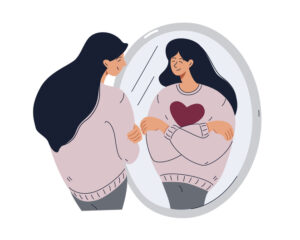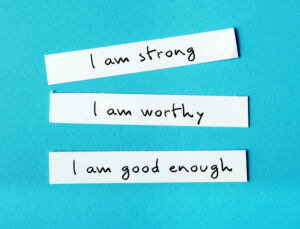Going through a breakup can feel like the end of the world. Whether it’s a long-term relationship or a short-lived romance, the end of something meaningful can leave you feeling lost, hurt, and overwhelmed. But, as painful as it is, a breakup is also an opportunity for growth and self-discovery.
Why Breakups Hurt So Much
First, it’s important to understand why breakups are so painful. When you’re in a relationship, your brain becomes wired to your partner. The connection you share releases feel-good chemicals like dopamine and oxytocin, which help bond you together (Fisher, 2004). So when that bond is broken, your brain goes into a kind of withdrawal. It’s not just an emotional reaction—it’s a physical one, too.
On top of that, breakups often stir up a mix of emotions: sadness, anger, confusion, relief, guilt, and even fear. You might grieve not just for the person you’ve lost but for the future you imagined together. All of this can feel like a heavy weight on your chest, making it hard to move forward.
The Grieving Process: It’s Okay to Not Be Okay
One of the most important things to remember after a breakup is that it’s okay to grieve. In fact, it’s necessary. Grief isn’t just reserved for when someone passes away—it’s a natural response to any significant loss, including the end of a relationship (Stroebe et al., 2007).
Grieving is a process, and it doesn’t follow a set timeline. You might feel okay one day and completely shattered the next. That’s normal. The key is to allow yourself to feel all of your emotions without judgment. Cry if you need to, scream into a pillow if it helps, and give yourself permission to feel whatever comes up.
Finding Yourself Again
When you’re in a relationship, it’s easy to become so intertwined with your partner that you lose sight of who you are as an individual. After a breakup, one of the first steps to healing is reconnecting with yourself.
Start by rediscovering the things that make you happy. What hobbies did you enjoy before the relationship? What passions did you put on hold? Now is the time to dive back into those activities. Whether it’s painting, running, traveling, or writing, engaging in something you love can be incredibly therapeutic.
Spending time with friends and family is also crucial. They can provide the support and distraction you need while reminding you that you’re loved and valued outside of the relationship.
Learning from the Experience
As painful as breakups are, they often come with valuable lessons. Once the initial shock has passed, take some time to reflect on the relationship. What did you learn about yourself? What
patterns do you notice in your past relationships? Understanding these patterns can help you grow and avoid repeating the same mistakes in the future (Wallerstein, 2000).
It’s also important to recognize that relationships end for a reason. Even if it’s hard to see at the moment, trust that this breakup is leading you toward something better—whether that’s a stronger relationship with yourself or with someone new down the line.
Coping with Loneliness and Negative Thoughts
After a breakup, it’s common to feel lonely or be plagued by negative thoughts. You might start to question your self-worth or worry that you’ll never find love again. When these thoughts creep in, try to challenge them. Remind yourself that you are worthy of love and happiness and that this breakup doesn’t define you.
To combat loneliness, stay connected with your support system. Reach out to friends for a chat or plan activities that get you out of the house. Volunteering or joining a new group can also help you meet new people and fill the void left by your ex.
Taking Care of Your Mental and Physical Health
Breakups can take a toll on both your mental and physical health. It’s easy to neglect yourself when you’re feeling down, but this is when self-care is most important. Make sure you’re eating well, getting enough sleep, and staying active. Exercise, in particular, can be a great way to boost your mood and reduce stress (Babyak et al., 2000).
If you’re struggling to cope, don’t hesitate to seek professional help. A therapist can provide a safe space to explore your feelings, work through your grief, and develop coping strategies. Remember, asking for help is a sign of strength, not weakness.
Moving On and Opening Your Heart Again
Eventually, the pain of the breakup will start to fade, and you’ll find yourself ready to move on. This doesn’t mean forgetting the relationship or pretending it didn’t happen—it means accepting that it’s over and being open to new possibilities.
When you’re ready, take things slow. There’s no rush to jump into a new relationship. Focus on continuing to build the life you want for yourself. When the right person comes along, you’ll be in a healthier, more confident place to welcome them into your life.
Final Thoughts
Breakups are hard—there’s no way around that. But they’re also a part of life that we all go through at some point. While it might feel like your world is falling apart, remember that you will get through this. By allowing yourself to grieve, rediscovering who you are, and learning from the experience, you can turn this painful chapter into one of growth and transformation.
Take care of yourself, and know that brighter days are ahead.
Author: Linh Nguyen, B. Psychology (Hons), M. ClinPsych
Linh is a General Psychologist at Vision and M1 Psychology. Her educational background includes a Bachelor of Psychological Science (Hons), and she has completed her Postgraduate Master’s Degree in Clinical Psychology.
To make an appointment with Linh Nguyen try Online Booking. Alternatively, you can call M1 Psychology Loganholme on (07) 3067 9129.
References
Babyak, M., Blumenthal, J. A., Herman, S., Khatri, P., Doraiswamy, M., Moore, K., … & Krishnan, K. R. (2000). Exercise treatment for major depression: Maintenance of therapeutic benefit at 10 months. Psychosomatic Medicine, 62(5), 633-638.
Fisher, H. E. (2004). Why We Love: The Nature and Chemistry of Romantic Love. Henry Holt and Company.
Stroebe, M., Hansson, R. O., Schut, H., & Stroebe, W. (Eds.). (2007). Handbook of Bereavement Research and Practice: Advances in Theory and Intervention. American Psychological Association.
Wallerstein, J. S. (2000). The Unexpected Legacy of Divorce: A 25-Year Landmark Study. Hyperion.


